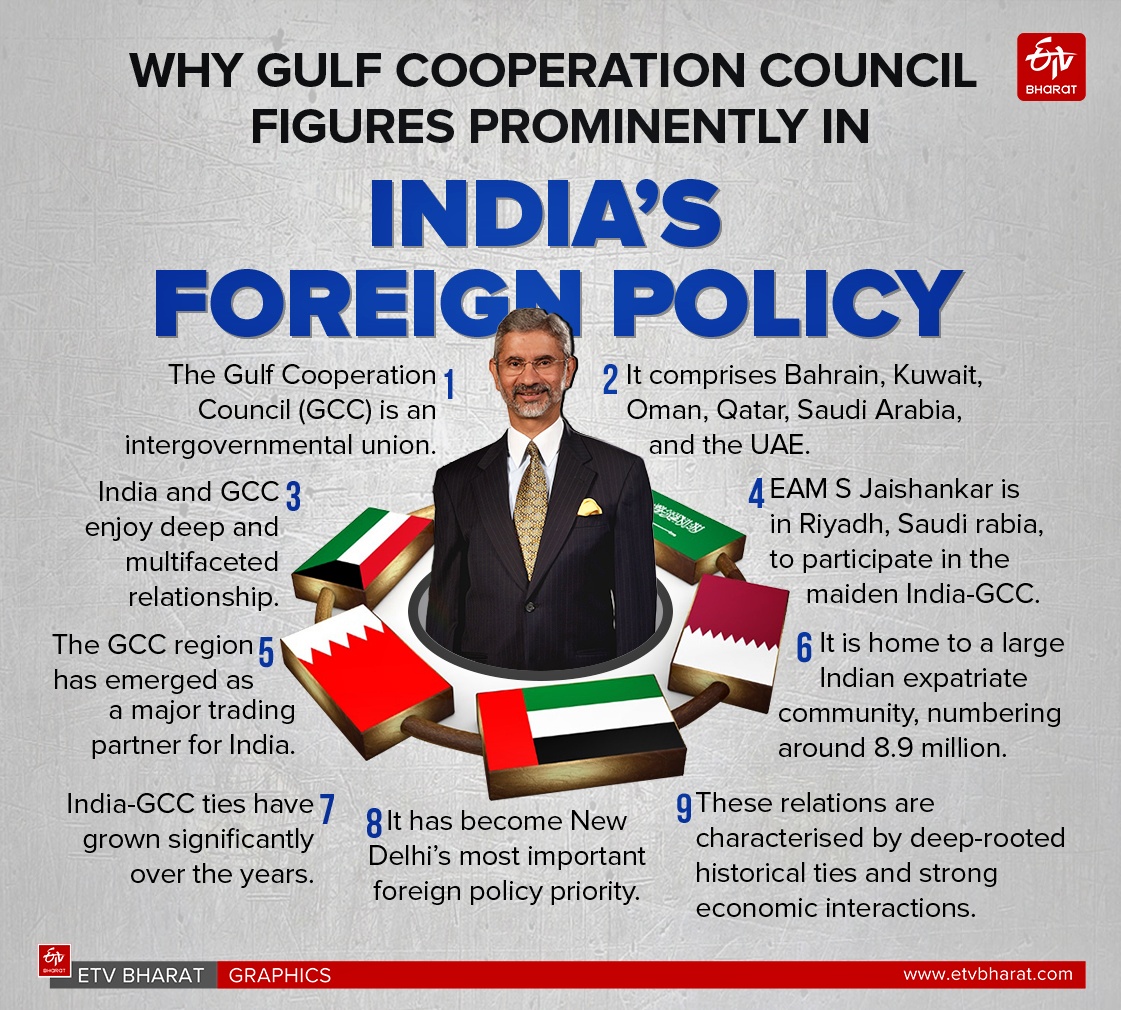New Delhi: On Sunday, when Crown Prince of Abu Dhabi Sheikh Khaled bin Mohamed bin Zayed Al Nahyan landed in New Delhi on a two-day official visit to India, External Affairs Minister S Jaishankar was already in Riyadh, Saudi Arabia, where he will be participating in the first-ever India-Gulf Cooperation Council (GCC) Foreign Ministers’ Meeting.
During his visit to Saudi Arabia, Jaishankar is also scheduled to hold separate bilateral meetings with the foreign ministers of the GCC member countries – Bahrain, Kuwait, Oman, Qatar, Saudi Arabia and the United Arab Emirates (UAE).
According to a statement issued by the External Affairs Ministry, India and the GCC enjoy a deep and multifaceted relationship, in areas including political, trade & investment, energy cooperation, and cultural and people-to-people ties.
“The GCC region has emerged as a major trading partner for India and is home to a large Indian expatriate community, numbering around 8.9 million,” the statement reads. “The Foreign Ministers’ meeting will be an opportunity to review and deepen institutional cooperation between India and the GCC across various sectors.”

The relationship between India and the GCC countries has grown significantly over the years, becoming one of New Delhi’s most important foreign policy priorities. These relations are characterised by deep-rooted historical ties, strong economic interactions, and an increasing focus on strategic cooperation.
The Gulf constitutes the “immediate” neighbourhood of India separated only by the Arabian Sea. The GCC has emerged as a major trading partner for India and it also has a vast potential as an important investment partner, which is well evident from the slew of investment announcements by GCC countries in India, particularly the UAE and Saudi Arabia. The GCC’s substantial oil and gas reserves are of immense importance for India’s energy security.
Political dialogue
The first-ever India-GCC Political Dialogue was held on the sidelines of the UN General Assembly on September 26, 2003. Both sides recognised the significance of this dialogue, which marked a new era in the India-GCC relationship. India and GCC signed a Memorandum of Understanding (MoU) on the Mechanisms of Consultations on September 10, 2022, during Jaishankar’s visit to Riyadh.
The MoU creates a framework for annual dialogue between EAM and the GCC-Troika (GCC secretary general, foreign minister of the country holding the current GCC presidency, and foreign minister of the country that will hold the next GCC presidency), and other foreign ministers or senior Officials from the GCC countries. Following the signing of the MoU, the first India-GCC Senior Officials’ Meeting was held on March 20, 2023, in Riyadh. Jaishankar’s current visit to Saudi Arabia is in line with this MoU.
Strategic relations
From the strategic point of view, India and GCC share the desire for political stability and security in the region. The common political and security concerns of India and GCC translate into efforts for peace, security and stability in the Gulf region and South Asia.
India has increased its defence cooperation with GCC countries, including joint military exercises, training, and intelligence sharing. India’s naval presence in the Gulf region has been strengthened to secure critical sea lanes of communication and counter piracy and terrorism threats.
The rise of extremist groups in the Middle East has prompted India and the GCC countries to enhance cooperation in counterterrorism. Both sides have been working closely to share intelligence and counter-radicalisation, emphasising the need to combat terrorism financing and prevent the spread of extremist ideologies.
The strategic location of the Gulf region, connecting vital shipping routes, makes maritime security a crucial aspect of India-GCC relations. India has actively engaged in maritime dialogues with GCC countries to ensure the safety of the sea lanes, especially the Strait of Hormuz, through which a significant portion of India’s energy imports transit.
Economic and commercial relations
India’s economic linkages with the GCC have increased steadily, especially due to growth in oil imports. These have increased significantly in the financial year 2022-23 due to rising oil prices in the wake of the Russian-Ukrainian conflict, as well as due to the resumption of demand following the COVID-19 pandemic disruption.
India and the GCC share a substantial trade relationship, with the GCC being one of India's largest trading blocs. India’s trade with the GCC exceeds $100 billion annually. Major imports from the GCC include crude oil, natural gas, and petrochemical products, while India exports textiles, machinery, food products, and electronics.
According to figures shared by the Directorate General of Foreign Trade under the Ministry of Commerce and Industry, during the financial year 2023-24, India-GCC bilateral trade stood at $161.59 billion. India’s exports were $56.3 billion in financial year 2023-24 while India’s imports were $105.3 billion.
The UAE is India’s biggest trading partner among the GCC countries with bilateral trade amounting to $83.6 billion during this period. Saudi Arabia comes second with bilateral trade totalling $42.9 billion. During 2023-24, bilateral trade with Qatar stood at $14 billion, with Kuwait $10.4 billion, with Oman $8.9 billion and with Bahrain $1.7 billion.
The GCC countries have started investing significantly in India across various sectors such as infrastructure, energy, real estate, and startups. The UAE, in particular, has emerged as one of the top investors in India, while the Saudi Public Investment Fund (PIF) has committed to investing billions of dollars in India’s infrastructure, technology, and energy sectors.
The Indian diaspora in the GCC plays a vital role in the economic engagement between the two regions. These expatriates send billions of dollars in remittances back to India each year, contributing significantly to India’s foreign exchange reserves and economic stability. The Indian diaspora in the GCC countries has been recognised for their contribution to the development of the region and are also appreciated for their hard-working, law-abiding and peaceful nature.
Read More



